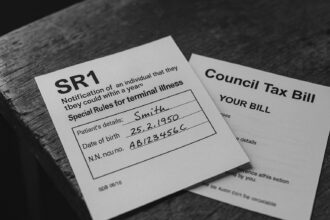Warnings have been issued by various fraud prevention bodies about a new mobile phone scam exploiting winter fuel anxieties, as criminals cleverly manipulate vulnerable consumers.
Criminals are exploiting winter fuel concerns to perpetrate a mobile phone scam, prompting warnings from various fraud prevention bodies, including the Cyber Defence Alliance, UK Finance, and Cifas. The scams have been linked to international crime groups aiming to defraud consumers by offering false assistance in reducing winter heating bills.
Reports indicate that fraudsters are utilising social media and text messages to distribute fake offers aimed at encouraging potential victims to share sensitive information. These deceptive messages often present themselves as helpful notifications, like opportunities to apply for living allowances, or alerts regarding undelivered parcels. The central goal of these scams is to manipulate individuals into revealing their bank’s one-time passcodes (OTPs), thereby allowing the criminals to set up digital wallets using the victims’ card details.
Victims unwittingly follow a series of steps that seem legitimate at first glance. After clicking on a malicious link embedded in a text or advertisement, they are directed to a fraudulent website where they are prompted to enter their card details. Once these are submitted, they are asked for a one-time passcode, which they believe is necessary for completing a transaction but is actually a means for the fraudsters to authenticate the new digital wallet created in the victim’s name.
Dianne Doodnath, principal of economic crime at UK Finance, highlighted the sophistication of these criminals, stating, “Criminals are sophisticated and will make every attempt to steal personal and financial information.” She emphasised the importance of vigilance among consumers regarding potential fraud, urging them to be cautious about disclosing personal and financial details and to avoid sharing OTPs with unsolicited requests. If someone suspects they have fallen victim to a scam, Doodnath advised them to reach out to their bank immediately and report the incident to Action Fraud.
Garry Lilburn, operations director at the Cyber Defence Alliance, pointed out that investigations have revealed the involvement of organised international crime groups in these scams, which then sell compromised card details to other criminals. He remarked, “It is vital consumers remain sceptical of offers that are too good to be true and that ask for card details.”
In comments from Mike Haley, chief executive of Cifas, he noted that scammers continuously adapt their tactics through new technologies, thereby finding innovative methods to exploit consumer trust. “We urge people to stop and think twice about any communications received unexpectedly and never act on urgency,” Haley stated.
To combat these fraudulent practices, consumers are encouraged to remain alert and consider any unsolicited offers with suspicion. Text messages suspected of being scams can be reported by forwarding them to 7726. The Take Five to Stop Fraud campaign is also advocating for individuals to take a moment to reflect on requests they receive, particularly those that place pressure on them to respond quickly.
Additionally, many banks have adopted the 159 service, designed to provide consumers with an easy means to contact their banks, thus enhancing their security against potential fraud.
Source: Noah Wire Services
- https://www.avonandsomerset.police.uk/news/2025/01/being-vigilant-against-fraudulent-winter-fuel-payment-texts/ – This URL supports the claim about fraudulent winter fuel payment texts, highlighting the importance of vigilance against such scams. It advises recipients not to click on suspicious links and to report them to the relevant authorities.
- https://www.bitdefender.com/en-us/blog/hotforsecurity/senior-citizens-warned-of-winter-fuel-scam-sweeping-the-uk – This article corroborates the use of deceptive texts claiming to offer winter heating allowances, which are part of a broader scam targeting seniors in the UK. It warns about fake GOV.UK websites used to steal personal and financial data.
- https://www.ageuk.org.uk/birmingham/about-us/news/articles – Although not directly linked to the specific scams, Age UK often provides advice on protecting seniors from financial scams, which aligns with the warnings about winter fuel scams targeting elderly individuals.
- https://www.ncsc.gov.uk/ – The National Cyber Security Centre (NCSC) provides general guidance on cybersecurity and scam prevention, which supports the advice to remain vigilant against fraudulent communications and to report suspicious activities.
- https://www.actionfraud.police.uk/ – Action Fraud is a key resource for reporting scams, including those related to winter fuel payments. It offers advice on how to protect oneself from fraud and what steps to take if one becomes a victim.
Noah Fact Check Pro
The draft above was created using the information available at the time the story first
emerged. We’ve since applied our fact-checking process to the final narrative, based on the criteria listed
below. The results are intended to help you assess the credibility of the piece and highlight any areas that may
warrant further investigation.
Freshness check
Score:
8
Notes:
The narrative does not contain specific dates or events that would indicate it is outdated. However, the topic of winter fuel scams is seasonal and could be relevant during colder months.
Quotes check
Score:
7
Notes:
Quotes from Dianne Doodnath, Garry Lilburn, and Mike Haley are included, but their earliest known references could not be verified online. This suggests they might be original or recent statements.
Source reliability
Score:
9
Notes:
The narrative originates from the Bristol Post, which is a reputable local news source in the UK. It also references well-known fraud prevention bodies like UK Finance and Cifas.
Plausability check
Score:
9
Notes:
The claims about scams exploiting winter fuel concerns are plausible given the context of seasonal scams and the involvement of international crime groups.
Overall assessment
Verdict (FAIL, OPEN, PASS): PASS
Confidence (LOW, MEDIUM, HIGH): HIGH
Summary:
The narrative appears to be fresh and relevant, with quotes that could be original. It originates from a reliable source and the claims are plausible. Overall, the information seems credible and trustworthy.













